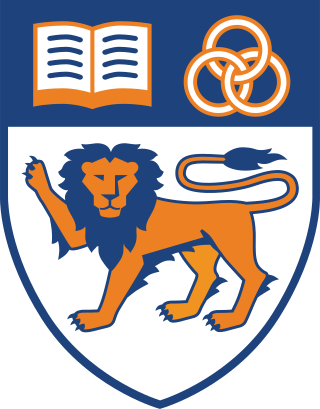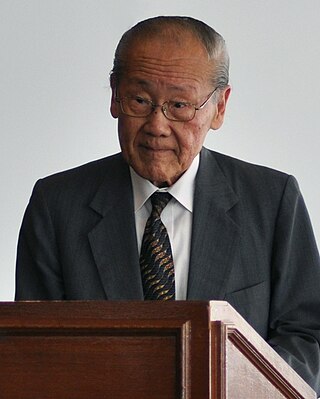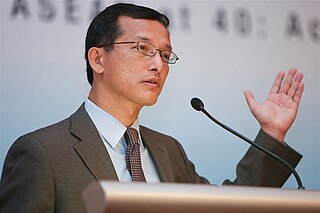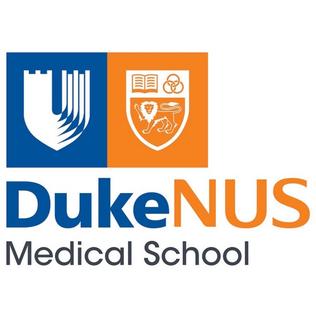Related Research Articles

The National University of Singapore (NUS) is a national public research university in Singapore. It was officially established in 1980 by the merger of the University of Singapore and Nanyang University.

Wu Teh Yao was a Chinese political scientist. He was an educator and a specialist in Confucianism and political science.

Wang Gungwu, is an Australian historian, sinologist, and writer specialising in the history of China and Southeast Asia. He has studied and written about the Chinese diaspora, but he has objected to the use of the word diaspora to describe the migration of Chinese from China because both it mistakenly implies that all overseas Chinese are the same and has been used to perpetuate fears of a "Chinese threat", under the control of the Chinese government. An expert on the Chinese tianxia concept, he was the first to suggest its application to the contemporary world as an American Tianxia.

The Pan Island Expressway is the oldest and longest expressway in Singapore. It is also Singapore's longest road. The expressway runs from the East Coast Parkway near Changi Airport in the east to Tuas in the west and has a total length of 42.8 kilometres.

The National University Hospital (NUH) is a tertiary referral hospital and academic medical centre in Singapore, located in Kent Ridge. It is a 1,160-bed tertiary hospital serving more than 670,000 outpatients and 49,000 inpatients and serves as a clinical training centre and research centre for the medical and dental faculties of the National University of Singapore (NUS).

Chan Heng Chee is a Singaporean academic and diplomat who has been serving as Ambassador-at-Large at the Ministry of Foreign Affairs since 2012, Chairwoman of the National Arts Council and Member of the Presidential Council for Minority Rights. She had also served as Singapore Ambassador to the United States between 1996 and 2012.

Kishore Mahbubani is a Singaporean diplomat and geopolitical consultant who served as Singapore Permanent Representative to the United Nations between 1984 and 1989, and again between 1998 and 2004, and President of the United Nations Security Council between 2001 and 2002.
The Institute of Policy Studies (IPS) is a think-tank that studies and generates public policy ideas in Singapore. Established in 1988, IPS became an autonomous research centre of the Lee Kuan Yew School of Public Policy at the National University of Singapore in 2008. A centre for social indicators research, Social Lab, was set up by IPS in November 2013. The board of directors at the institute includes high ranking Singapore government officials, diplomats, directors of multinational businesses, and leaders of academic institutions.

Nanyang Academy of Fine Arts is a publicly-funded post-secondary arts institution in Singapore, and a constituent college of the University of the Arts Singapore (UAS) from 2024.

Simon Tay Seong Chee is a Singaporean lawyer and legal academic who served as a Nominated Member of Parliament between 1997 and 2003.

The Duke–NUS Medical School (Duke–NUS) is a graduate medical school in Singapore. The school was set up in April 2005 as the Duke–NUS Graduate Medical School, Singapore's second medical school, after the Yong Loo Lin School of Medicine, and before the Lee Kong Chian School of Medicine. It is a collaboration between Duke University in the United States and the National University of Singapore in Singapore. Duke-NUS follows the American model of post-baccalaureate medical education, in which students begin their medical studies after earning a bachelor's degree. Students are awarded degrees from both Duke University and the National University of Singapore.

Tan Chorh Chuan is a Singaporean college administrator and professor who served as the second president of the National University of Singapore between 2008 and 2017. He is currently a professor at the National University of Singapore.

Yale-NUS College is a liberal arts college in Singapore. Established in 2011 as a collaboration between Yale University and the National University of Singapore, it is the first liberal arts college in Singapore and one of the first few in Asia. With an average acceptance rate of 5.2%, it is among the most selective institutions in the world. Yale-NUS was the first institution outside New Haven, Connecticut that Yale University had developed in its 300-year history, making Yale one of the first American Ivy League schools to establish a college bearing its name in Asia.

Zheng Yongnian is a Chinese political scientist and political commentator who has studied and written on contemporary China and especially on Chinese politics. Zheng joined the Chinese University of Hong Kong, Shenzhen in September 2020 and was appointed Director of the Advanced Institute of Global and Contemporary China Studies. He became the founding dean of the university's School of Public Policy in September 2024. He was a professor and director of the East Asian Institute, National University of Singapore since 2008 until his resignation in 2020 amid alleged incidents of sexual misconduct.
Li Chenyang is a professor of Philosophy at Nanyang Technological University in Singapore. He is internationally recognized for his work in Chinese philosophy and comparative philosophy, best known for his work in the Confucian philosophy of harmony, and comparative studies of Confucian ethics and feminist care ethics.

Hsu Yun Tsiao was a scholar of Overseas Chinese and Southeast Asian history.
Thiagarajan Kanaga Sabapathy, better known as T.K. Sabapathy, is a Singaporean art historian, curator, and critic. Sabapathy has written, researched, documented, and supported contemporary visual art in Singapore and Malaysia for four decades. He has held positions at the National University of Singapore, Nanyang Technological Institution, and National Institute of Education as a lecturer of art history. Sabapathy further established and headed pioneering art research facilities in Singapore, such as the Contemporary Asian Art Centre (2001–2004) and subsequently, Asia Contemporary (2015–).
John Norman Miksic is an American-born archaeologist.
References
- ↑ Staff writer (2024). "East Asian Institute, National University of Singapore (EAI)". UIA Global Civil Society Database. uia.org. Brussels, Belgium: Union of International Associations. Yearbook of International Organizations Online. Retrieved 31 January 2025.
- ↑ "NUS East Asian Institute". www.eai.nus.edu.sg. Retrieved 15 October 2017.
- ↑ Auto, Hermes (10 June 2019). "New leadership at Singapore think tank East Asian Institute | The Straits Times". www.straitstimes.com. Retrieved 5 January 2022.
- ↑ "New East Asian institute takes on more open style". The Straits Times. 17 April 1997.
- ↑ "NUS East Asian Institute". www.eai.nus.edu.sg. Retrieved 15 October 2017.
- ↑ "The task ahead: To review Confucian ethics". The Straits Times. 2 July 1983. Retrieved 15 October 2017.
- ↑ "HK man donates $3 m to institute". The Straits Times. 2 July 1983. Retrieved 15 October 2017.
- ↑ "Debut of Confucian Ethics in English". The Straits Times. 13 January 1984. Retrieved 15 October 2017.